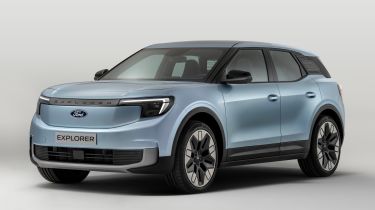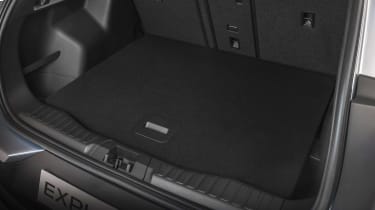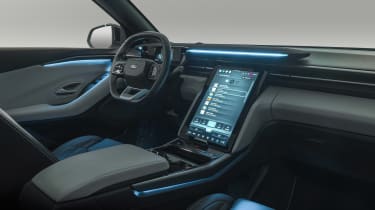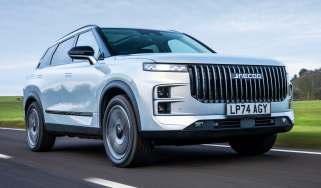New Ford Explorer electric SUV delayed until summer 2024
The new electric Ford Explorer is delayed until summer 2024, after an original autumn 2023 launch
- Shares underpinnings with Volkswagen ID.4
- Range of over 300 miles
- Prices from around £40,000
The Ford Explorer electric SUV, originally slated for release this autumn, has been delayed until summer 2024. New EU electric car battery and powertrain safety regulations have been introduced in recent times, and it’s reported that the delay comes as Ford makes sure the model conforms to these.
 The best electric family cars – our top picks of 2025
The best electric family cars – our top picks of 2025
In a statement to CarBuyer, Ford has said “We are excited to bring the electric Explorer to our customers in Europe, the first electric passenger vehicle produced in our new Ford Cologne Electric Vehicle Center. Ford is embracing the incoming technical standard for electric vehicles (UN Regulation 100.3) because it is consistent with our internal philosophy to deliver safe, high-quality vehicles to customers around the globe. This means the new Explorer will now be delivered to customers in the summer of 2024.”
The model will be a big departure for the brand, with the Ford Explorer name having previously been used on gas-guzzling petrol SUVs. It will now be an electric SUV and built as such from the ground up – the result of an ongoing partnership between Ford and the Volkswagen Group. The new Explorer is essentially a rebodied VW ID.4, utilising that car’s platform, batteries and electric motors.
Designed to sit below the existing Mustang Mach-E, but above the forthcoming, all-electric version of the Puma crossover, the Explorer is a mid-size rival for cars like the Skoda Enyaq iV, Hyundai Ioniq 5 and BMW iX1.
2023 Ford Explorer design
The Explorer’s design is said to reflect Ford’s “American heritage” while “emphasising efficiency using streamlined and aerodynamic surfaces for a seamless, cutting-edge, crafted appearance.”
The front end of the new car is certainly reminiscent of the US-spec Ford Explorer, with large headlights and a distinctive daytime running-light signature. There’s no conventional grille, however, with the EV’s nose dominated by a piece of “coast-to-coast” black trim that runs the width of the car, and a new, two-dimensional Ford logo.
To the side, the roofline stays high to preserve cabin space, while Explorer buyers will get a choice of 19 to 21-inch wheels, with the largest options having a detrimental effect on the car’s range. The longest-range Explorer – a rear-wheel-drive model with the bigger of the two batteries – can manage up to 335 miles on a charge. More on the car’s technical specs can be found below.
At the rear, that “coast-to-coast” element is repeated, connecting a pair of vertically-aligned LED tail-lights. The wide, stocky appearance is emphasised by the narrow rear window; the Ford’s overall design could be generally considered less ‘cute’ than the Volkswagen on which it’s based, though a facelifted version of the ID.4 is expected before too long.
Opening up that tailgate reveals a 450-litre boot; bigger than the Mustang Mach-E – despite being pitched as a more affordable model in the Ford range – but down on the ID.4’s 550-litre load area. The Explorer doesn’t offer cable storage under the bonnet, but there’s space under the moveable boot floor should you need it.
Practicality was considered a big deal for Ford’s designers, and there are plenty of clever features inside to make family life less stressful. The 17-litre MegaBox between the front seats, for example, is big enough for three bottles of water, or a 15-inch laptop. There’s a hidden storage area behind the main screen, too.
Infotainment and equipment
On the subject of which, one big criticism of the ID.4 was its laggy and unresponsive infotainment system, but Ford says it has listened to feedback in order to address some of the VW’s failings. As such, it has ditched the ID.4’s screen setup wholesale and fitted its own 15-inch portrait touchscreen running Ford’s latest SYNCMove software. The system can provide full-screen mapping, as well as full-screen connectivity via Apple CarPlay or Android Auto.
This display can slide on its axis, moving in small increments by up to 30 degrees. This allows owners to prioritise a more upright setup – perhaps when using the mapping or media controls – or a laid-back stance, maybe when cruising at a steady speed. The main screen is complemented by a five-inch digital instrument cluster showing speed, nav, or trip information.
Other specifications haven’t been confirmed, though we do know the car will be offered with a choice of base and Premium trims. Ford says all cars will come with heated massage seats and a heated steering wheel, plus two-zone climate control and a soundbar mounted to the top of the dashboard. Sensico man-made leather is reserved for top-spec cars, while a panoramic roof and automatic tailgate will be available as optional extras.
Quality was another point of interest for Ford’s team of engineers and designers. We’ve only had a prod and poke around a prototype version thus far, though even here the materials felt far more high-end than we’d previously found in the ID.4. Ford says it has added a “consistent 3mm of give” to the tops of the Explorer’s doors for a “supple feel”.
As with the Explorer’s spec sheet, prices will be confirmed nearer the car’s launch. However, given its positioning in the market, as well as within Ford’s existing model range, we expect a starting figure of around £40,000, with range-toppers costing over £50k.
Range, motors and charging
As mentioned, the Ford Explorer shares its basic mechanical platform with the Volkswagen ID.4. It also shares that car’s battery and motor tech – albeit with a few subtle differences.
The basic Ford Explorer comes with a single rear-mounted motor producing 168bhp. This is fed by a 55kWh battery (52kWh usable capacity) for a combined range, Ford claims, of 218 miles. No performance figures have been revealed as yet.
Above this, is a more powerful 282bhp version, again with a single motor but this time utilising a larger 82kWh (77kWh usable) battery. That bumps range to 335 miles – the longest of any Explorer at launch.
The flagship Ford Explorer is a dual motor model with 335bhp – 40bhp more than the most powerful ID.4 GTX. This model uses the same 82kWh battery as the punchier single-motor Ford, but the extra shove sees its range fall to 305 miles. Its maker says this version is rated to tow up to 1,400kg.
Smaller-battery models can charge at up to 130kW, while those with the larger 82kWh setup boost this to 170kW – matching the fastest-charging Volkswagen cars like the ID. Buzz. That means every Explorer can perform a 10-80% charge in around 25 minutes.
Can’t wait till 2024 for a zero-emissions family car? Check out our list of the top 10 best electric SUVs
Recommended

New Subaru Trailseeker revealed as rugged electric SUV with 375bhp

New Subaru Solterra brings more range, power and polish
Most Popular

Suzuki’s new 10-year warranty is free – here’s how to get it
Tips & advice

Car dashboard warning lights: what does each symbol mean?

Electric car charging stations: public networks, charger types, apps and maps














